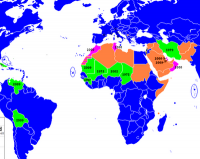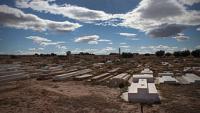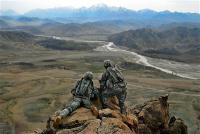-
Jihadi cyberattacks; ISIS’s sex slaves; Iran’s missile test

Hackers affiliated with the Jihadist group have been developing the capabilities to attack U.S. government and civilian targets, and such targets in other countries; Theologians working with ISIS have issued detailed and specific ruling on women slaves – explaining when “owners” of these women can have sex with them and who else among ISIS members may be entitled for sex services from enslaved women; On 26 December, the Iranian navy fired several rockets near three Western warships in the Gulf of Hormuz.
-
-
U.K. unprepared for terror attacks outside London: Experts

Security experts in the United Kingdom have expressed concerns about whether the United Kingdom has sufficient resources to respond to acts of terrorism outside of London. The questions were raised against the backdrop of reports that a “friendly” intelligence agency —- presumably, the CIA – has warned the governments of several European countries, the United Kingdom among them, that terrorists were planning a large-scale attack in a European capital on New Year’s Eve.
-
-
Tighter airport employee security; ISIS senior operative killed; Norway tightens asylum laws; West Bank settlements
The TSA is increasing the number of random checks of employees – of both airports and airlines — who hold badges which allow them to enter restricted area at airports; The Pentagon said that Charaffe al-Mouadan, a French national who had joined ISIS in Syria, was killed in a 24 December U.S. airstrike; The Norwegian government said that it is planning to ask the Norwegian parliament to change forty or so major and minor asylum laws in order to tighten the country’s asylum policy; Israel continues to plan for building in the E1 area of the West Bank — if the plan is implemented, it would, in effect, cut the West Bank in half, making the creation of a contiguous, viable Palestinian state impossible.
-
-
“Shared bad memories” bind fighters, terrorists to their groups

What binds military fighters or terrorists together so tightly that they are willing to sacrifice their own lives for their causes? Previous research has shown that such extreme behavior can be driven by “identity fusion,” a strong sense of “oneness” with their group. Researchers have now shed new light on the role that shared emotional experiences plays in this fusion between people’s personal and group identities.
-
-
Yes, let’s have a frank and open discussion about the causes of extremism and terrorism
Recent research, set out to identify why Muslims in Western societies embrace violent extremism, identified four causes: personal and collective grievances; networks and interpersonal ties; political and religious ideologies; and enabling environments and support structures. Tackling these causes in a holistic way is what is required to counter violent extremism effectively. Uninformed comments from politicians about Islam do not promote an open and informed debate. They serve only to sideline and alienate Muslims who are best placed to tackle Islamists and violent extremists. The irony is that alienation and marginalization also make the role of counter-terrorism policing much harder. Emphasizing only one possible cause of terrorism and extremism is all about politics. What we need instead is a sincere effort to actually think about and solve the problem of violent extremism.
-
-
European capitals on alert after warnings of possible terror attacks before the New Year

Police forces in several European capitals say that they have been advised by a “friendly” intelligence service of the possibility of fresh terror attacks launched before the New Year. The reports did not name specific capitals, but that security measures in Vienna, Austria, have been beefed up considerably. The Austrian police said they were responding to concrete information about the possibility of an attack between Christmas and the New Year which would take place in “crowded places.”
-
-
Brazil-Israel stand-off over embassy appointment; teaching German to children refugees

Israel’s outgoing ambassador to Brazil, Reda Mansour, has completed his tour in Brasilia last week and returned to Israel. Brazil, however, is unwilling to accept his replacement — Dani Dayan, a former head of the Jewish settlement council in the Palestinian territories who lives in the occupied West Bank; Germany is in the process of recruiting 8,500 teachers to teach German to children of refugees. The German government estimates that about 196,000 refugee children will enter the German school system this year.
-
-
San Bernardino mosque may be reason for barring British Muslim family from entering U.S.

Muhammad Mahmood, 47, who is a U.S. citizen and who a runs a car repair shop in San Bernardino, California, speculated that the reason his two brothers, their wives, and their children — all of them British citizens – have been barred from entering the United States to visit Disneyland was that he prays at the same mosque where one of the San Bernardino shooters, Syed Farook, used to pray.
-
-
Survey reveals religious tolerance and declining extremism in Tunisia

A new survey reveals significant shifts in how Tunisians view the role of religion in politics, religious tolerance, political violence, Western political models, and their own national identity. The survey, conducted during the spring and summer of 2015, shows an increase in support for social individualism, a decline in support for political Islam, a significant increase in preference for Western-style democratic government, and an increase in religious tolerance.
-
-
France’s emergency anti-terrorism laws; Russian air strikes’ toll; DHS deportation campaign
The French government plans to propose constitutional amendments aiming to shield state-of-emergency measures from legal challenges; Russian air strikes in Syria, which began 30 September. The Russian strikes have killed 2,132 people, a third of them civilians; DHS is set to launch a campaign to deport illegal immigrant families who arrived in the United States since the beginning of 2014.
-
-
Russia may be committing war crimes by using banned munitions, targeting civilians: Amnesty

Russian air strikes in Syria have killed hundreds of civilians and caused massive destruction in residential areas, striking homes, a mosque, and a busy market, as well as medical facilities, in a pattern of attacks that show evidence of violations of international humanitarian law, Amnesty International in a new briefing published on Tuesday. Evidence, including photos and video footage, gathered by Amnesty suggests that the Russians have used unguided bombs in densely populated civilian areas, as well as internationally banned deadly cluster munitions. Weapons experts who analyzed images of Russian air attacks said the nature of the destruction caused by the attacks indicated possible use of fuel-air explosives (also known as “vacuum bombs”), a type of weapon particularly prone to indiscriminate effects when used in the vicinity of civilians.
-
-
Arab public opinion overwhelmingly opposes ISIS

The most comprehensive public opinion poll in the Arab world found that the Arab world as a whole is overwhelmingly opposed to ISIS, with 89 percent of respondents saying that they have negative views of the group, compared to only 7 percent of Arabs who view the extremist organization positively. The results of the survey also show no significant correlation between support for ISIS and religiosity: In other words, support for radical extremist organizations in the Arab world, where it exists, is rooted in political grievances within the Arab region and its conflicts, and not in a religious ideology. The 2015 Arab Opinion Index was released on Monday. The twelve countries in which the survey – which used randomized, self-weighted, multi-stage cluster method — was conducted comprise 90 percent of the population of the Arab League.
-
-
Smoking Argentinian gun; Turkey, Israel getting closer; Libya military action looms

Former Argentine Foreign Minister Héctor Timerman knew that Iran was responsible for the 1994 bombing of the AMIA Jewish center in Buenos Aires while he was negotiating with Iran for lucrative business deals on behalf of the Argentinian government two years ago; Saleh al-Arouri, one of the planners of the murder of the three Jewish teenagers in Gush Etzion in June 2014, was expelled from Turkey at Israel’s request, thus removing one more obstacle from the path of normalization of relations between Turkey and Israel; U.K. planes may begin attacking ISIS targets in Libya as part of an international coalition force as the UN Security Council is set to approve a resolution supporting the new Libyan government.
-
-
Better understanding of hybrid warfare needed: Experts

In recent years, armed conflicts have increasingly been fought in a “hybrid” way, in which adversaries rely on a combination of conventional and non-conventional tactics to achieve their military and political objectives. Legal experts say it is essential that the MATO member nations gain a better understanding of the legal challenges posed by new methods of warfare.
-
-
UN refugee chief: Anti-Muslim refugee rhetoric helps ISISI propaganda, recruitment

The UN refugee chief, criticizing U.S. and European politician who want to block Syrian refugees from resettling in their countries, told the Security Council Monday that “Those that reject Syrian refugees, and especially if they are Muslim, are the best allies of the propaganda and the recruitment of extremist groups.”
-
More headlines
The long view
Factories First: Winning the Drone War Before It Starts
Wars are won by factories before they are won on the battlefield,Martin C. Feldmann writes, noting that the United States lacks the manufacturing depth for the coming drone age. Rectifying this situation “will take far more than procurement tweaks,” Feldmann writes. “It demands a national-level, wartime-scale industrial mobilization.”
No Nation Is an Island: The Dangers of Modern U.S. Isolationism
The resurgence of isolationist sentiment in American politics is understandable but misguided. While the desire to refocus on domestic renewal is justified, retreating from the world will not bring the security, prosperity, or sovereignty that its proponents promise. On the contrary, it invites instability, diminishes U.S. influence, and erodes the democratic order the U.S. helped forge.
Fragmented by Design: USAID’s Dismantling and the Future of American Foreign Aid
The Trump administration launched an aggressive restructuring of U.S. foreign aid, effectively dismantling the United States Agency for International Development (USAID). The humanitarian and geopolitical fallout of the demise of USAID includes shuttered clinics, destroyed food aid, and China’s growing influence in the global south. This new era of American soft power will determine how, and whether, the U.S. continues to lead in global development.
Water Wars: A Historic Agreement Between Mexico and US Is Ramping Up Border Tension
As climate change drives rising temperatures and changes in rainfall, Mexico and the US are in the middle of a conflict over water, putting an additional strain on their relationship. Partly due to constant droughts, Mexico has struggled to maintain its water deliveries for much of the last 25 years, deliveries to which it is obligated by a 1944 water-sharing agreement between the two countries.
How Disastrous Was the Trump-Putin Meeting?
In Alaska, Trump got played by Putin. Therefore, Steven Pifer writes, the European leaders and Zelensky have to “diplomatically offer suggestions to walk Trump back from a position that he does not appear to understand would be bad for Ukraine, bad for Europe, and bad for American interests. And they have to do so without setting off an explosion that could disrupt U.S.-Ukrainian and U.S.-European relations—all to the delight of Putin and the Kremlin.”
How Male Grievance Fuels Radicalization and Extremist Violence
Social extremism is evolving in reach and form. While traditional racial supremacy ideologies remain, contemporary movements are now often fueled by something more personal and emotionally resonant: male grievance.
